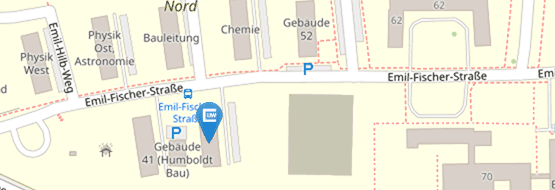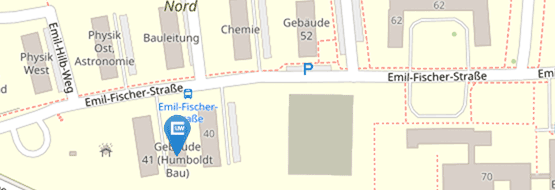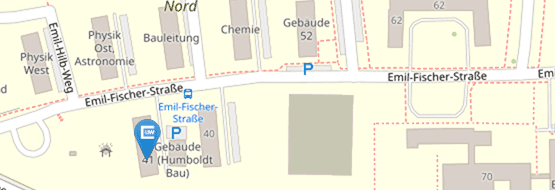Annual Master Focus
Every academic year a new focus is offered: lectures and seminars prepare the way for current research topics in a select field. Mathematics International Master students may choose such a focus during their studies but are not obliged to do so.
Organizers: Madeleine Jotz Lean, Stefan Waldmann
Winter semester 2023/2024
- Lecture series with exercises: Differential Geometry (Prof. Dr. M. Jotz Lean, 10 ECTS)
The master course differential geometry is designed on one hand to teach the basics of differentiable manifolds, namely: topological and differentiable manifolds, smooth charts, and atlases, smooth structures, smooth maps and diffeomorphisms, regular submanifolds, the tangent and cotangent bundles, tensor calculus, connections, critical points and values of smooth maps, immersions and submersions a glimpse on linear Lie groups and some representation theory (complementing the Lie theory course) group actions, quotients, homogeneous spaces.
On the other hand it serves as the basis for several subsequent master courses, and certain RiGs, in particular for most of the other courses in this course programme. - Lecture series with exercises: Lie Theory (Prof. Dr. S. Waldmann, 10 ECTS)
In this series of lectures Lie groups and Lie algebras are introduced. We start by discussing the concrete matrix Lie groups, in particular we discuss all classical examples of matrix Lie groups. Then we introduce Lie algebras and some of their properties, like solvability and nilpotency, as well as some classical structural results on Lie algebras. We prove Ado's theorem stating that any finite-dimensional Lie algebra is a matrix Lie algebra.
Then we turn to the abstract definition of a Lie group, and to the notions of Lie subgroups and Lie group homomorphisms. For this part of the lectures, necessary background on differential manifolds is needed, but the series of lectures on differential geometry can be followed in parallel. The rest of the lectures establishes the equivalence of categories (called Lie's theorems) between simply connected Lie groups and their infinitesimal objects the finite dimensional Lie algebras, and the equivalence between Lie subalgebras and Lie subgroups. This relies heavily on the study of regular foliations, in particular on Frobenius' theorem, which is also discussed in detail in the lectures.
Summer semester 2024
- Lecture series with exercises: Riemannian and pseudo-Riemannian Geometry (Prof. Dr. M. Jotz Lean, 10 ECTS)
Based on the master course differential geometry (see above) we cover many aspects of Riemannian and pseudo-Riemannian geometry:- affine connections with emphasis on Levi-Civita connections,
- geodesics and introduction to variational calculus (following Milnor),
- different notions of curvature (e.g. Ricci, Riemann, sectional and their relationship to classical treatments a la Gauss),
- applications to homogeneous and symmetric spaces.
- Lecture series with exercises: Geometric Mechanics (Prof. Dr. S. Waldmann, 10 ECTS)
This master course is a first introduction to geometric mechanics. We will discuss classical Newtonian mechanics using differential geometric methods within the context of symplectic geometry. The Hamiltonian approach to mechanics based on cotangent bundles as phase spaces will be central for this approach. The Lagrangean formulation of mechanics will be formulated on the tangent bundle of the configuration space. The comparison between the two will give, among many other aspects, a new look on Riemannian geometry through the symplectic looking glass. But geometric mechanics will not stop at these two (equivalent) versions but requires more general symplectic manifolds as phase spaces. In particular, the presence of symmetries and conserved quantities will lead to phase space reductions which yields quite generic symplectic manifolds as result. Finally, Poisson manifolds provide a yet more general framework of great importance when it comes to questions like quantization.
Winter semester 2024/2025 and summer semester 2025
In the following two semesters further classes, seminars or research in groups on special topics will be offered that allow to deepen the knowledge in Algebra and Dynamics of Quantum Systems and Analysis and Geometry of Classical Systems, and that can lead to a master thesis (15-20 ECTS + 30 ECTS for the master thesis).
It is also possible to choose lecture series with exercises, seminars or research groups on different topics from our master programs Mathematics, Computational Mathematics, Mathematical Physics and Economathematics.
Organizers: Daniel Wachsmuth, Alfio Borzi, Frank Werner
Winter semester 2022/2023
- Lecture series with exercises: Basics of optimization (Prof. Dr. D. Wachsmuth, 10 ECTS)
In this course, finite-dimensional optimization problems are studied both from a theoretical and a practical viewpoint. We investigate optimization algorithms for problems with and without constraints. Particular emphasis is placed on the analysis of optimality conditions for problems with constraints. Contents: Algorithms for smooth optimization (e.g., gradient descent, Newton methods), Optimality conditions for constrained problems (KKT-system and existence of Lagrange multipliers), Algorithms for contrained problems (Penalty, SQP).
-
Lecture series with exercises: Optimal control (Prof. Dr. A. Borzi, 5 ECTS) Optimal control theory concerns the design of control mechanisms applied to differential models in order to achieve given goals.
This theoretical framework stems from the calculus of variation and includes many modelling issues ranging from the definition of control strategies to the formulation of the purpose of the controls. This lecture provides an introduction to the formulation, analysis and numerical solution of optimal control problems governed by ODEs and PDEs.Topics: Formulation of ODE optimal control problems, Existence of optimal controls, Optimality conditions, Optimality conditions in Hamiltonian form, Pontryagin maximum principle, Numerical solution of ODE optimal control problems, Linear-quadratic feedback-control problems, Formulation of PDE optimal control problems, Existence of optimal controls, Optimality conditions, Numerical methods and applications.
Summer semester 2023
- Lecture series with exercises: Infinite-dimensional optimization (Prof. Dr. D. Wachsmuth, 10 ECTS)
Infinite-dimensional optimization problems appear in many applications: as soon as unknowns of the problem are elements of function spaces, the resulting optimization problem is no longer finite-dimensional. Such problems appear for instance in optimal control and inverse problems. We study intensively the questions of existence of solutions and of first-order optimality conditions. These will be compared to the concepts known from finite-dimensional optimization. Contents: Topological vector spaces, Existence of solutions, Differentiability in normed spaces, Necessary and sufficient optimality conditions.
- Lecture series with exercises: Variational regularization of inverse problems (Prof. Dr. F. Werner, 5 ECTS)
In this lecture, we focus on Inverse Problems, which occur in many relevant applications ranging from astronomy over image processing to biophysics. After a brief introduction to this field we will study variational regularization schemes, in which the unknown quantity of interest is reconstructed via the solution of a minimization problem. We will discuss elementary properties such as existence, stability, uniqueness and convergence and will afterwards investigate the speed of convergence under appropriate conditions.
Winter semester 2023/2024 and summer semester 2024
In the following two semesters further classes, seminars or research in groups on special topics will be offered that allow to deepen the knowledge in partial differential equations and their applications, and that can lead to a master thesis (15-20 ECTS + 30 ECTS for the master thesis).
It is also possible to choose lecture series with exercises, seminars or research groups on different topics from our master programs Mathematics, Computational Mathematics, Mathematical Physics and Economathematics.
Organizers: Prof. Dr. Komla Domelevo, Prof. Dr. Christian Klingenberg and Prof. Dr. Anja Schlömerkemper
Winter semester 2021/2022
- Lecture series with exercises: Partial differential equations of mathematical physics (Prof. Dr. C. Klingenberg, 10 ECTS)
We will elucidate the physical origins of the main partial differential equations (PDEs) of classical mathematical physics, including the fundamental equations of fluid and solid mechanics, thermodynamics, and classical electrodynamics. These PDEs form the backbone of modern applications in physics and other natural sciences.
- Lecture series with exercises: Applied Analysis (Prof. Dr. K. Domelevo, 10 ECTS)
In this course we focus on linear partial differential equations and study their properties with methods from functional analysis. To this end we will consider various function spaces, embedding theorems and compactness properties and investigate second-order elliptic equations as well as linear evolution equations.
- Seminars or research groups on related or different topics from the regular master program (5-10 ECTS). It is also possible to choose a further lecture series with exercises from our master programs Mathematics, Computational Mathematics, Mathematical Physics and Economathematics.
Summer semester 2022
- Lecture series with exercises: Navier-Stokes equations (Prof. Dr. A. Schlömerkemper, 5 ECTS)
The Navier-Stokes equations model the motion of viscous fluids. They are applied in the modeling of weather, air flow around a wing, ocean currents, flow of viscoelastic materials and many more. Despite their wide range of application, there are still major open mathematical problems. For instance, it is not known in three dimensions whether smooth solutions to the incompressible Navier-Stokes equations exist at all times for smooth initial data, which is part of the so-called Millennium problem of the Clay Mathematical Institute. Still there are important results in the mathematical theory of the three-dimensional Navier-Stokes equations, which we will address in this lecture series.
- Lecture series with exercises: Hyperbolic equations (Prof. Dr. C. Klingenberg, 10 ECTS)
We will consider an important class of mathematical models coming from science and technology that are described by partial differential equations based on the balance of the physical quantities mass, momentum, and energy. Examples that will be presented are the compressible Euler equations, the equations of magnetohydrodynamics, and kinetic equations like the Vlasov or Boltzmann equations.
- Lecture series with exercises: Numerics of partial differential equations (Prof. Dr. K. Domelevo, 10 ECTS)
The partial differential equations introduced in the first semester of this Master Focus can be connected to their applications via their numerical discretization. In this course these methods will be introduced, for example finite elements method, discontinuous Galerkin method, finite differences and finite volume methods. Applications will be kept in mind in the sections of topics.
- Seminars or research groups on related or different topics from the regular master program (5-10 ECTS). It is also possible to choose a further lecture series with exercises from our master programs Mathematics, Computational Mathematics, Mathematical Physics and Economathematics to replace one of the above.
Winter semester 2022/2023 and summer semester 2023
In the following two semesters further classes, seminars or research in groups on special topics will be offered that allow to deepen the knowledge in partial differential equations and their applications, and that can lead to a master thesis (15-20 ECTS + 30 ECTS for the master thesis).
It is also possible to choose lecture series with exercises, seminars or research groups on different topics from our master programs Mathematics, Computational Mathematics, Mathematical Physics and Economathematics.
Prepare your way for current research topics in COMPUTATIONAL NUMBER THEORY such as advanced methods for primality testing and factoring integers, cryptosystems, computational aspects in algebraic number theory, the computation of L-functions, and local methods and their various applications.
Organizers: Prof. Dr. Jörn Steuding, Prof. Dr. Stephan Elsenhans.
Winter semester 2020/2021
- Lecture series with exercises: Number Theoretical Algorithms (Prof. Dr. S. Elsenhans, 10 ECTS)
In this class we will study methods for testing primality, factoring integers and computing discrete logarithms in finite fields. Further, we will introduce the continued fraction method for rational approximation. This can be applied to some Diophantine equations. (Literature: Cohen: A Course in Computational Algebraic Number Theory, Forster: Algorithmische Zahlentheorie, Eric Bach: Algorithmic Number Theory)
- Lecture Series with exercises: Computational Aspects of Algebraic and Analytic Number Theory (Prof. Dr. J. Steuding, 10 ECTS)
We begin with a brief introduction to algebraic number theory and study in particular the splitting of primes and ideals in number fields. A second focus is on computational aspects of zeta- and L-functions as they appear in algebraic number theory and the theory of modular forms; here we are concerned with special values, functional equations, the analytic class number formula (related to the ideal class group), and the localization of zeros (with respect to the two unsolved Millennium problems from number theory, namely the Riemann hypothesis and the conjecture of Birch & Swinnerton-Dyer). Excellent literature on these topics: "Algebraic Number Theory" by Fröhlich & Taylor, "Zetafunktionen und quadratische Körper" by Zagier, "Riemann's Zeta-Function" by Edwards.
- Seminars or research groups on related or different topics from the regular master program (5-10 ECTS). It is also possible to choose a further lecture series with exercises from our master programs Mathematics, Computational Mathematics, Mathematical Physics and Economathematics.
Summer semester 2021
- Lecture series with exercises: Local Methods and Their Applications (Prof. Dr. S. Elsenhans, 10 ECTS)
The first part of the class will be an Introduction to p-adic numbers and local fields. The second half will present the following applications: Factoring polynomials over the rationals, computing subfields of numberfields and computing Galois groups of number fields. (Literature: Jürgen Neukich: Algebraic Number Theory)
- Seminars or research groups on related or different topics from the regular master program (5-10 ECTS). It is also possible to choose a further lecture series with exercises from our master programs Mathematics, Computational Mathematics, Mathematical Physics and Economathematics.
Winter semester 2021/2022 and summer semester 2022
In the following two semesters further classes, seminars or research in groups on special topics will be offered that allow to deepen the knowledge in computational number theory and its applications, and that can lead to a master thesis (15-20 ECTS + 30 ECTS for the master thesis).
It is also possible to choose lecture series with exercises, seminars or research groups on different topics from our master programs Mathematics, Computational Mathematics, Mathematical Physics and Economathematics.





